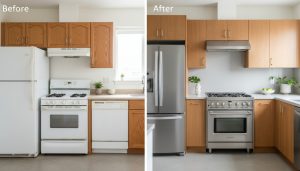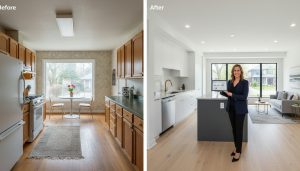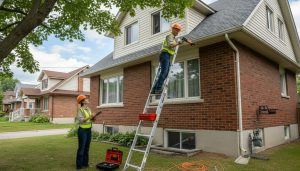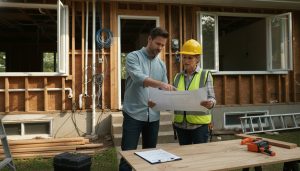Tired of losing out on houses in the GTA? Or maybe you need to sell your place fast but don’t know where to start?
This is your guide. Simple steps. Real advice. We cover buying and selling homes in the Greater Toronto Area. Think Georgetown, Milton, Guelph, Acton, Oakville, and Burlington. No fluff. Just what you need to know.
Understanding the GTA West Market: What’s Happening Now (2024-2025)?
The news talks big about the GTA. But what about your town? The market is different in Oakville than it is in Acton. Knowing your local scene helps you make smarter moves.
Things slowed down a bit from the crazy peak. But good houses still sell fast. Especially in popular spots. Interest rates make people think harder about money. But lots of people still want to buy.
Here’s a quick look at areas you care about:
Georgetown & Acton: Small Town Feel, Big Decisions
- What’s Selling: Lots of families look here. They want detached homes with yards. Townhouses are popular too.
- Prices: Generally more affordable than places closer to Toronto. But prices have gone up. Expect competition for well-kept homes under the average price point.
- Trends (2024/2025): Steady demand. Buyers are careful but ready to move for the right house. Sellers need good pricing. Overpriced homes sit longer. Expect prices to hold fairly steady, maybe small increases if rates drop.
Milton: Growing Fast
- What’s Selling: Newer homes, townhouses, semis. Popular with young families and commuters.
- Prices: Milton saw huge jumps. It’s cooling slightly but still competitive. Bidding wars happen, especially on move-in ready places.
- Trends (2024/2025): Inventory is key. When more houses are listed, buyers have choices. When fewer are listed, prices get pushed up. Watch inventory levels closely. First-time buyer programs Ontario are helpful here.
Guelph: University City & More
- What’s Selling: Diverse mix. Student housing near the university. Family homes in the suburbs. Downtown condos.
- Prices: Guelph has its own strong market. Less tied to Toronto’s swings sometimes. Still, affordability is a concern.
- Trends (2024/2025): Stable demand, partly thanks to the university and local jobs. Finding a real estate agent in Guelph who knows the neighbourhoods is important. Market likely to see moderate, steady growth.
Oakville & Burlington: Lakeside Living, Higher Prices
- What’s Selling: Luxury homes, executive townhouses, condos near the lake. Great schools attract families.
- Prices: These are premium areas. Prices are higher than other spots we mentioned. Competition for desirable homes is fierce.
- Trends (2024/2025): Inventory is tight, especially for detached homes. Buyers need big budgets and strong offers. Selling your house fast Burlington means pricing it right from day one. Expect continued price strength, though maybe not the wild growth of past years.
Expert Insight:
“Buyers in Guelph and Milton are smart. They do their homework. But they need to be fast. Good listings often get offers within days. Get your financing sorted before you look.” – Local Mortgage Broker Insight (Simulated)
Getting Ready to Buy: Money First
Buying a house starts with money. Boring? Yes. Important? Absolutely.
Get Mortgage Pre-Approval. Seriously.
Don’t just think you can afford a house. Know it. Talk to a bank or mortgage broker. Get a real pre-approval letter.
- Why it matters: Sellers take pre-approved buyers seriously. In places like Oakville or Milton, an offer without pre-approval might get ignored. Especially if there are other offers.
- Know your budget: Pre-approval tells you the maximum you can borrow. This helps you look at the right houses. Don’t waste time on places you can’t afford.
- Lock in a rate?: Sometimes you can lock in an interest rate for a while. This protects you if rates go up while you’re house hunting.
Figure Out Your REAL Budget
The bank tells you the max loan. But can you really afford those payments? Think about:
- Mortgage payment (principal and interest)
- Property taxes (these vary a LOT by town – check local municipal websites)
- Home insurance
- Utilities (heat, hydro, water)
- Closing costs (lawyer fees, land transfer tax, etc. – budget 1.5% to 4% of the purchase price)
- Moving costs
- Money for repairs or updates
Don’t stretch yourself too thin. Owning a home costs more than just the mortgage.
Saving Your Down Payment
How much do you need? It depends.
- Less than $500k house: Minimum 5% down.
- $500k to $1M house: 5% on the first $500k, 10% on the portion above $500k.
- Over $1M house: Minimum 20% down.
Saving takes time. Look into government programs. The First-Time Home Buyer Incentive or using your RRSP funds (Home Buyers’ Plan) might help. Check the rules carefully. [Link to Government of Canada Home Buying Programs page]
Finding Your GTA Home: The Hunt
Okay, money sorted. Now the fun part? Sort of. It can be work.
Work With a Good Real Estate Agent
Yes, you can look online yourself. But a good local agent helps a lot.
- They know the area: A Guelph agent knows Guelph streets. An Oakville agent knows Oakville schools.
- They find houses faster: Agents get listings sometimes before they hit public websites.
- They help with offers: They know strategies. They handle paperwork.
- They negotiate for you: This is key, especially when dealing with sellers or multiple offers.
How to choose? Ask friends. Interview a few. Find someone you trust. Make sure they work in the specific towns you like.
Start Searching
- Online sites: Realtor.ca is the main one. Lots of others exist.
- Agent alerts: Your agent can set up automatic emails for new listings matching your needs.
- Drive around: See neighbourhoods yourself. Get a feel for them.
Visiting Homes: Look Past the Staging
Sellers make houses look nice. That’s smart. You need to look deeper.
- Big stuff: Check the roof, windows, furnace, air conditioning. Ask about their age.
- Layout: Does it work for you? Ignore the paint colour. Think about room flow.
- Basement: Look for dampness or cracks.
- Outside: Check the foundation, grading (does water slope away from the house?), fence.
- Neighbourhood: Visit at different times. Day, night, weekend. Is it noisy? What’s parking like?
Take notes. Take pictures (if allowed). It’s easy to forget details after seeing many houses.

Making an Offer: This is Where it Gets Real
You found a house! Now you need to convince the seller to pick you. Especially if others want it too.
How to Write a Strong Offer
Your offer isn’t just about price. It’s a package deal.
- Price: Needs to be realistic. Your agent helps here. Look at what similar homes nearby sold for (called ‘comparables’). In hot markets like Milton or Burlington, you often need to offer over the asking price.
- Deposit Amount for Home Buying: A bigger deposit shows you’re serious. It tells the seller you have cash ready. Typical is around 5% of the purchase price, but a larger deposit can strengthen your offer in competitive situations.
- Conditions (Offer Contingencies Home Buying): These protect you. Common ones are financing (making sure you get the mortgage) and inspection (hiring someone to check the house). Fewer conditions make your offer stronger for the seller. But be careful removing them.
- Closing Date: When you take ownership. Try to match the seller’s preferred date if you can. Flexibility helps.
Winning a Bidding War: Competitive Home Offer Tips
Multiple offers are common in Georgetown, Guelph, everywhere. It’s stressful. Here are real estate offer strategies:
- Offer Your Best Price: Sometimes there’s no second chance. Don’t play games if you really want the house. Decide your maximum before you offer.
- Big Deposit: Shows strength. Makes the seller feel secure.
- Minimize Conditions (Carefully!): This is a major way of increasing offer strength.
- Should I waive conditions? This makes your offer very attractive. BUT it’s risky. If you waive financing and the bank says no later? Big trouble. If you waive inspection and find huge problems later? You’re stuck.
- Alternative: Maybe do a pre-inspection before offering. Costs you money even if you don’t get the house. But it lets you make an offer with no inspection condition, safely.
- Be Flexible on Closing: Ask the seller what date they prefer. Matching it can be a small win.
- Write a Letter?: Sometimes, telling the seller why you love the house helps. Keep it short and genuine. Some people like it, some don’t care. Ask your agent.
Expert Insight:
“In today’s market, especially in places like Oakville, a clean offer often wins. That means best price, solid deposit, and ideally, no conditions. But waiving conditions isn’t for everyone. Talk to your agent and lawyer. Understand the risks.” – Experienced GTA Real Estate Agent (Simulated)
Home Buying Negotiation
The seller might accept your offer. Or reject it. Or sign it back with changes (a counter-offer).
- Counter-offers: They might ask for more money, a different closing date, etc. You can accept, reject, or counter back.
- Your agent guides you: They handle the back-and-forth. Stay calm. Stick to your budget.
Making an offer in a hot market requires speed and strategy. Be prepared.
Selling Your GTA Home: Getting it Gone
Selling seems easier than buying. But doing it well takes work. You want the best price, fast.
Prepare Your House: Make it Shine
First impressions matter. A lot.
- Declutter: Get rid of stuff. Everywhere. Closets, counters, garage. Rent storage if needed.
- Deep Clean: Make it sparkle. Windows, floors, bathrooms, kitchen.
- Repairs: Fix small things. Leaky faucets, broken tiles, chipped paint. Big problems? Discuss with your agent if fixing them makes sense before listing.
- Curb Appeal: Mow the lawn. Weed the garden. Paint the front door. Make people want to come inside.
- Staging (Maybe): Sometimes hiring a professional stager helps. They arrange furniture to make rooms look bigger and better. Ask your agent if it’s worth the cost in your area (often yes in places like Oakville/Burlington).
Pricing it Right: The Biggest Factor
This is critical. Price too high? Buyers ignore it. Price too low? You lose money.
- Look at Comparables: Your agent pulls data on recent sales of similar homes nearby. This is the best guide.
- Market Conditions: Is it a buyer’s market (lots of listings, slow sales) or seller’s market (few listings, fast sales)? This affects pricing strategy.
- Your Home’s Condition: Be honest. Is it updated? Does it need work? Price reflects condition.
- Strategy: Sometimes pricing slightly below market value can create a bidding war. Risky, but can work. Discuss this with your agent.
Selling your house fast in Burlington or Milton often comes down to smart pricing from the start.
Marketing Your Home: Getting Eyeballs
Your agent handles most of this. But know what they should be doing:
- Photos/Video: Professional photos are a MUST. Bad photos kill interest. Video tours are great too.
- Online Listing: Detailed description on Realtor.ca and other sites.
- For Sale Sign: Obvious, but important.
- Open Houses/Showings: Plan for people coming through your home.
- Agent Network: Good agents promote listings to other agents.
Handling Offers on Your Home
You got an offer! Or maybe several. What now?
Reviewing the Offer(s)
Look beyond the price:
- Price: Highest isn’t always best (see conditions).
- Deposit: Bigger is better.
- Conditions: Financing, inspection, sale of buyer’s home. Fewer conditions mean a firmer deal.
- Closing Date: Does it work for you?
- Buyer’s Pre-Approval: Did they include proof they can likely get a mortgage?
Dealing with Multiple Offers (as a Seller)
This is a good problem to have. Your agent helps manage this.
- Set a Deadline: Ask for all offers by a certain time/date.
- Review Everything: Compare all aspects, not just price.
- Negotiate: You can accept one. Reject all. Or ask one or more buyers to improve their offers (be careful with this, follow rules).
- No Conditions is Strong: An offer with no conditions is very appealing, even if slightly lower price. Less risk for you.
Negotiation (Seller Side)
If you get one offer, you might need to negotiate.
- Counter-Offer: If the price is low or conditions are bad, you can sign back changes.
- Be Realistic: Know your bottom line. Don’t lose a good buyer over small stuff.
Legal Stuff & Closing Day: Almost Done!
Lawyers are important. Don’t skip this.
Hire a Real Estate Lawyer
- Buyer: Your lawyer checks the title (ownership), registers the mortgage, makes sure taxes are paid, arranges title insurance.
- Seller: Your lawyer prepares the deed, pays off your existing mortgage, ensures you get paid.
Find a lawyer experienced in real estate early in the process.
The Paperwork Mountain
Lots of documents. Agreement of Purchase and Sale, mortgage papers, land transfer forms, etc. Your lawyer and agent guide you. Read things. Ask questions if you don’t understand.
Closing Costs Recap
Remember these? They add up.
- Buyers: Land Transfer Tax (provincial AND Toronto has its own if buying there), legal fees, title insurance, adjustments (e.g., paying seller back for pre-paid property tax).
- Sellers: Legal fees, real estate agent commission, mortgage discharge fees (if any).
Closing Day
This is the day ownership officially transfers. Usually:
- Buyer gives remaining money (down payment minus deposit, plus mortgage funds) to their lawyer.
- Lawyers exchange documents and money electronically.
- Deed and mortgage are registered.
- Seller’s lawyer confirms money received.
- Keys are released to the buyer! (Usually late afternoon).
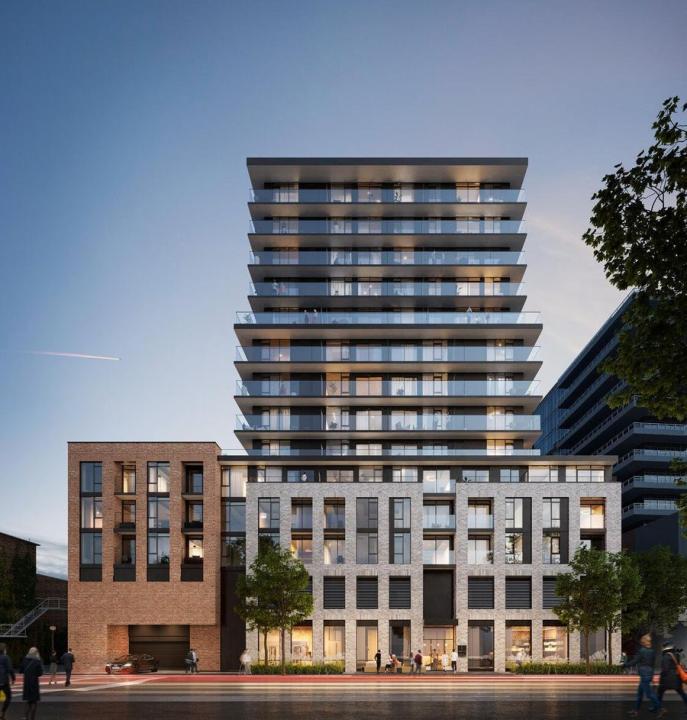
Moving In / Moving Out: The Final Step
Don’t forget the logistics.
Planning Your Move
- Book Movers or Truck: Do this weeks/months in advance. Especially in busy summer months.
- Change Address: Post office, banks, driver’s license, health card, subscriptions.
- Utilities: Arrange final readings at your old place. Set up accounts at your new place.
- Packing: Start early. Label boxes by room.
- Clean: Leave your old place clean (usually required by contract). Clean your new place before unpacking.
Moving is chaos. Plan ahead to make it less stressful.
You Can Do This
Buying or selling a home in the GTA – Georgetown, Milton, Guelph, Acton, Oakville, Burlington – feels huge. It is a big deal. But it’s manageable.
Get pre-approved early. Find a good local agent. Understand the market you’re in. Make strong offers (or price smart if selling). Be ready to act fast. Understand the risks, especially with conditions.
This guide gave you the steps. Now take the first one.
Need more specific advice for your situation? Talking to a local expert who knows your town is a great next step.
Frequently Asked Questions (FAQ)
Q: How much deposit do I really need in Milton or Guelph?
A: While 5% is often standard, in competitive markets like Milton, a larger deposit (even 7-10% if possible) makes your offer stronger. It shows sellers you’re serious and financially stable. In Guelph, 5% might be okay for some properties, but more helps in bidding wars. Talk to your agent.
Q: Is waiving a home inspection ever safe in Oakville?
A: Risky. Oakville has many older homes where issues can hide. Waiving means you accept the house ‘as is’. If you find major problems later, it’s on you. A pre-inspection before offering is a safer way to make an offer without an inspection condition. Or, consider an inspection condition with a very short timeframe (e.g., 2-3 days).
Q: What are property taxes like in Burlington vs. Georgetown?
A: They vary. Generally, Halton Region (Burlington, Oakville, Milton) and Halton Hills (Georgetown, Acton) have different tax rates. Plus, the assessed value of the home matters. Check the municipal websites for current rates (Town of Halton Hills, City of Burlington). Your agent can also provide estimates for specific listings.
Q: Are first-time home buyer programs Ontario really helpful?
A: They can be. The RRSP Home Buyers’ Plan lets you borrow from your RRSPs tax-free for a down payment (must repay it). The First-Time Home Buyer Incentive is a shared-equity loan from the government (they own a small piece of your home). Land transfer tax rebates exist too. Check eligibility carefully. [Link to Ontario Ministry of Finance Land Transfer Tax page] Programs have limits and rules.
Q: How do I find a good real estate agent in Guelph?
A: Ask friends or colleagues for referrals. Look for agents with lots of experience specifically in Guelph. Check online reviews. Interview 2-3 agents. Ask about their strategy for your situation (buying or selling). Choose someone you communicate well with and trust.
Q: Is it better to buy first or sell first in Acton?
A: Depends on the market and your finances. Selling first means you know exactly how much money you have for your next purchase (less stressful). Buying first means you secure your new home, but might need ‘bridge financing’ (a short-term loan) if your old place doesn’t sell before you close on the new one. In a slower market, selling first is often safer. In a fast market, buying first might be necessary if listings are scarce. Discuss risks with your agent and mortgage broker.
[Internal Link Placeholder: Link to another relevant blog post, e.g., ‘5 Mistakes GTA Home Sellers Make’]
[External Link Placeholder: Link to Real Estate Council of Ontario (RECO) consumer info page]






